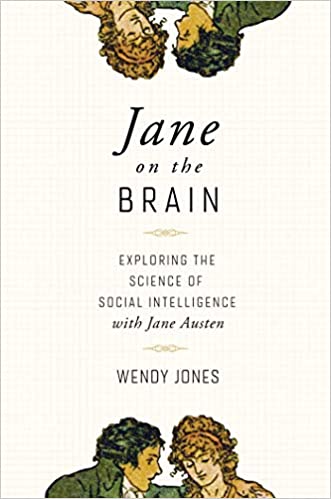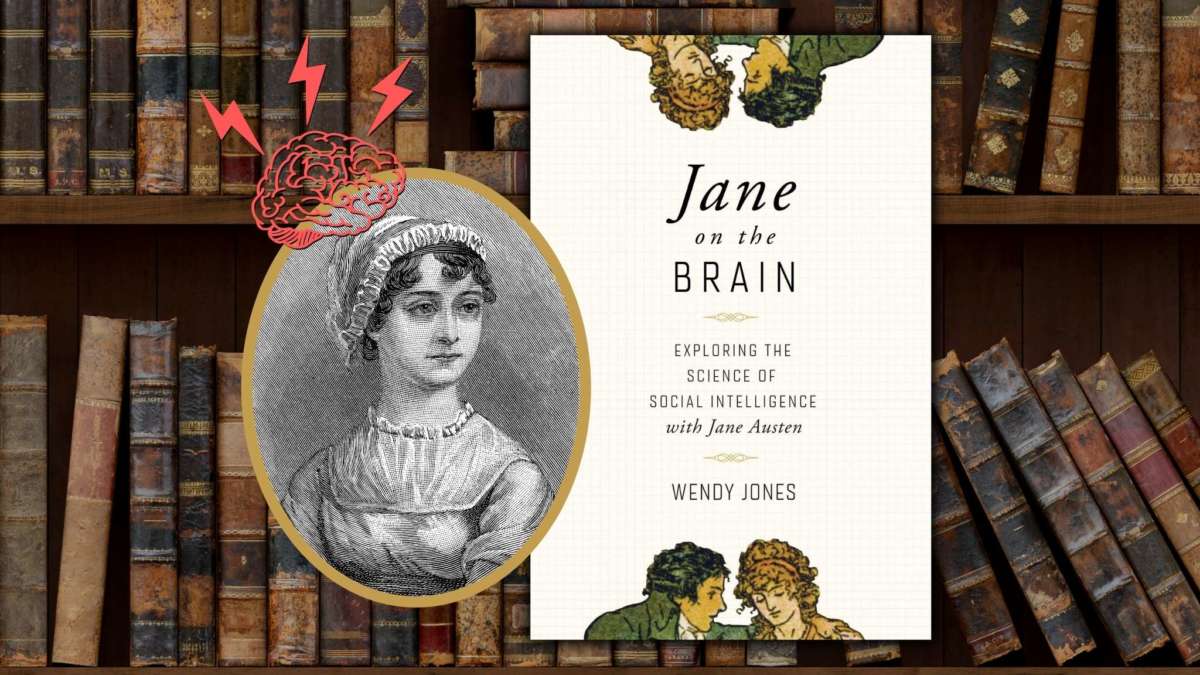Jane on the Brain: Exploring the Science of Social Intelligence by Wendy Jones
Therapist and Cornell English Professor Wendy Jones brings her dual career paths to bear on Jane Austen in her fascinating book, Jane on the Brain: Exploring the Science of Social Intelligence (Pegasus Books). The emotional resonance of Austen’s work accounts for her legions of devoted fans across time. Enraptured, we follow her characters as they conduct misguided, ill-considered, and well-intentioned-albeit-fumbling “attempt[s] to navigate their way to happiness,” as Jones says. Austen’s best plots involve misreadings, misunderstandings and social gaffes. As Jones observes, “Austen knew that the real drama of our lives most often comes from our everyday encounters with other people.” We share in these characters’ journeys as if they’re close friends, laughing and crying with them.
EVOLVING SOCIAL INTELLIGENCE AND STORY INVESTMENT
Jones outlines theories about social intelligence and how it evolved, exploring why we feel empathy and how this intrinsically wires us to invest in stories, even when we know they’re made up. She then discusses Austen’s singularity when it comes to capitalizing on this human impulse. As Jones writes, “To put this in the apt phrase of psychiatrist Daniel Siegel, when we read Austen, we have the feeling of ‘feeling felt,’ of having our innermost feelings understood and resonated with. This is inherently gratifying because as a species, humans crave such understanding. We have a profound need for empathy, to know that we’re not alone with our joys and sorrows.”
In addition to appealing to the readers’ sense of empathy, Austen’s characters exhibit varying degrees of this quality in their interactions amongst themselves, for, as Jones explains, “Austen’s stories not only convey [her] empathy [towards the characters] … but they’re about empathy as well — who has it, who lacks it, and how some of her characters deepen their capacity for this important quality” (emphasis mine). Her novels focus on the experience of empathy by unveiling it over and over.
AUSTEN ON THE CUTTING EDGE OF MODERN PHILOSOPHY
Beyond Austen’s nearly uncanny prescience when it came to the latest discoveries about social intelligence and her mastery of eliciting and demonstrating the power of empathy, her work was also on the cutting edge of modern philosophy. Indeed, Austen was a proponent of David Hume’s then-radical belief that reason and feelings are inextricably bound together. Some of Austen’s most memorable characters demonstrate how we must all accept this reality and manage our responses. For example, the headstrong and independent Elizabeth Bennett in Pride and Prejudice discovers and overcomes her emotional blind spot in regards to the surly Mr. Darcy, realizing that she’s misjudged his character by being overly influenced by her feelings.
Austen fans who will no doubt delight as Jones outlines the many ways in which these books work on a subconscious level and illustrate a keen understanding of the human psyche. Jane on the Brain has the potential for a wider audience as well, whether for writers looking to infuse their works with greater emotional depth or readers interested in examining literature through the lenses of neuroscience and psychology. Regardless of their reasons for picking up Jane on the Brain, readers will finish this book with a deepened appreciation for Austen’s marvelous genius.
RELATED POSTS
Get Your Austen On With These 8 Retellings of “Pride and Prejudice”
“The Jane Austen Society” Unites an Unlikely Band of Wounded Souls
Amy Meyerson’s Tempest in a California Bookshop





